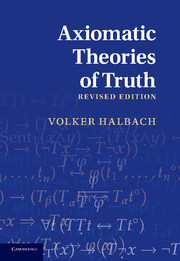Book contents
- Frontmatter
- Contents
- Preface
- Part I Foundations
- 1 Definitional and axiomatic theories of truth
- 2 Objects of truth
- 3 Tarski
- 4 Truth and set theory
- 5 Technical preliminaries
- 6 Comparing axiomatic theories of truth
- Part II Typed truth
- Part III Type-free truth
- Part IV Ways to the truth
- Index of systems
- Bibliography
- Index
4 - Truth and set theory
from Part I - Foundations
Published online by Cambridge University Press: 05 February 2015
- Frontmatter
- Contents
- Preface
- Part I Foundations
- 1 Definitional and axiomatic theories of truth
- 2 Objects of truth
- 3 Tarski
- 4 Truth and set theory
- 5 Technical preliminaries
- 6 Comparing axiomatic theories of truth
- Part II Typed truth
- Part III Type-free truth
- Part IV Ways to the truth
- Index of systems
- Bibliography
- Index
Summary
Arguments from analogy are to be distrusted: at best they can serve as heuristics. In this chapter I am using them for exactly this purpose. By comparing the theory of truth with set theory (and theories of property instantiation, type theory, and further theories), I do not expect to arrive at any conclusive findings, but the comparison might help one to arrive at new perspectives on the theory of truth and on the question of how closely truth- and set-theoretic paradoxes are related.
The theory of sets and set-theoretic membership on the one hand and the theory of truth and satisfaction on the other hand exhibit many similarities: both are paradox-ridden, allow circularities, and invite the application of hierarchical approaches. Russell's paradox and the liar paradox are arguably the most extensively discussed paradoxes in the philosophical literature, and they seem so intractable because they are founded on very basic and clear intuitions about sets and truth.
Moreover, certain remedies against the set-theoretic and the semantic paradoxes have been given the same labels; for example, ‘typing’: both kinds of paradoxes can be resolved by introducing type restrictions. While set theory was liberated much earlier from type restrictions, interest in type-free theories of truth only developed more recently.
- Type
- Chapter
- Information
- Axiomatic Theories of Truth , pp. 25 - 28Publisher: Cambridge University PressPrint publication year: 2014

